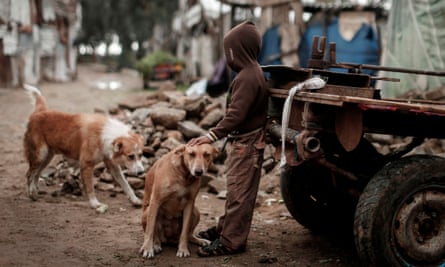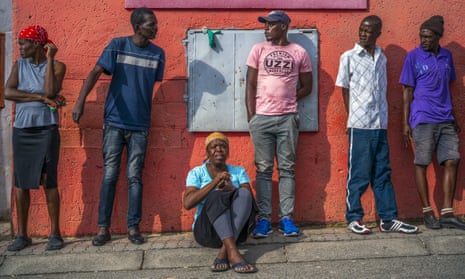Two decades of progress in the reduction of extreme poverty, the elimination of which is one of the sustainable development goals, have been pushed into a sharp reverse by a combination of the impact of the Covid-19 pandemic, the growing climate emergency and increasing debt.
With the World Bank warning of a “truly unprecedented increase” in levels of poverty this year, and renewing calls for debt forgiveness, experts are warning of a growing crisis in multiple areas from education to employment, likely to be felt for years to come.
While the World Bank was already pessimistic, in January it updated its forecast for the expected number of newly impoverished people this year from between 88 and 115 million to the new range of between 119 and 124 million.
Global poverty has seen a spectacular decline since the 1960s – when about 80% of the world’s population lived in extreme poverty. Today that number has been reduced to nearer 10%, with hundreds of millions of people removed from the extremes of hardship.
But the numbers are forecast to rise in the coming year, and it has not only been in the category of those living below the poverty line of $1.90 (£1.30) a day that increases have been seen. Experts have noted a worrying rise in numbers of people living on less than $3.20 (£2.35) between June last year and January 2021.

In recent months the growing crisis has been flagged up in multiple reports looking at indicators from the dropout rate in education in the developing world, to falling wages and rising unemployment, much of it driven by the pandemic, which has closed workplaces, schools and borders, and hammered the global economy.
Among those issuing warnings has been the International Labour Organization (ILO), which said global workers lost $3.7tn in earnings during the pandemic.
In its annual Global Wage report, issued late last year, the ILO reported that wages had fallen or were growing more slowly across the board in the first six months of 2020 and warned that the Covid-19 crisis was “likely to inflict massive downward pressure on wages in the near future”, with “women and low-paid workers disproportionately affected by the crisis”.
The report warned that even in the one-third of countries where average wages appeared to have increased, “this was largely as a result of substantial numbers of lower-paid workers losing their jobs and therefore skewing the average”.
But it has been the long-term and less visible effects that are concerning many, not least the impact on education.

Among those voicing increasing concern is Axel van Trotsenburg, managing director of operations at the World Bank.
“Our concern is that with this crisis we are seeing a reversal in the sustained reduction in extreme poverty and are now witnessing increases. The current estimates are an extra 150 million by the end of this year,” he said.
“This is a crisis that has shown just how fragile this progress is, and how much of an effort will be required to rebuild, not least faced with the addition of existing challenges like climate change.
“On top of that we are seeing increases in the other poor and unemployed outside of the definition of extreme poverty. It’s a clear sign that this crisis is already producing serious ripple effects.
“You have 1 billion kids out of school, and online education not accessible to many children in developing countries. We have done a lot of analysis on this, but just an extra year of school enhances earnings to the degree that if you lose that school year, then the estimate through lifespan, globally, means you are looking at a reduction in world GDP of $10tn.
“There is also a disproportionate number of girls who, when they leave school, will permanently quit education so will lose even more.”

And while the pandemic has affected countries rich and poor, Van Trotsenburg believes that challenges facing poorer countries are more deep-seated. “One of the major challenges in developing countries is that the majority of employment is in the informal sector.”
Andrew Shepherd and his colleagues at the Overseas Development Institute’s Chronic Poverty Advisory Network echo many of the observations of the World Bank and other global organisations.
And as Shepherd’s organisation has pointed out, cuts to western aid budgets have further complicated the picture.
“These budget cuts leave fewer resources available to tackle the longstanding challenges people have been facing, let alone the immediate struggles of daily subsistence and protection. In this context, the social and economic impacts of Covid-19 will continue to weigh heavily on low- and middle-income countries. And without adequate resources to tackle the overlap of poverty with climate change, conflict, crises of governance and uneven relationships with the global economy, these struggles will only be magnified.”

Shepherd points to the risk of new impoverishment in middle-income countries where families have left poverty in recent memory and are vulnerable to sinking back into it.
“One of the things that we have been seeing is the impoverishment of new groups who were not impoverished in the normal course of events.”
While Shepherd points to the effects of educational dropout during the pandemic as leading to long-term impacts, some of the consequences are less predictable.
“One aspect that came out of a recent study of returning migrants to Bangladesh from the Gulf [where they had lost their jobs], was that that their incomes had reduced to below other groups in labour markets, particularly in rural areas.
“We had worked on the hypothesis that this group would be more resilient. And that has not been in the case.
“The other big issue is in the urban informal sector in places such as Africa, people like market traders. With lots of markets closing, and the services dependent on them shutting down, that has meant a lot of loss of incomes.”

Homi Kharas, a senior fellow for global economy and development at the Brookings Institution, is concerned that for many of the global new poor, the impact of the Covid crisis is likely to last well beyond 2030.
In a paper last year, while arguing that some poverty “will be offset as economies start to recover in 2021”, he added that “the longer-term scenario suggests that half of the rise in poverty could be permanent. By 2030, the poverty numbers could still be higher than the baseline by 60 million people.”
Speaking in January, Børge Brende, president of the World Economic Forum, highlighted another critical issue.
“If we’re going to go into pre-Covid levels of global GDP, we will need to start investing in each other’s countries through foreign direct investment – that has gone down dramatically in the last year and a half.”
He added: “We also know that the global value chains and trade are struggling to get back to their pre-Covid levels. And we know that trade has been an engine of growth, and has lifted millions of people out of extreme poverty in the last three decades.”








